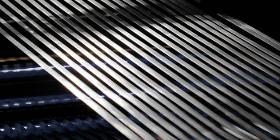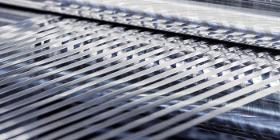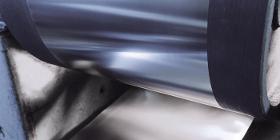- europages
- >
- COMPANIES - SUPPLIERS - SERVICE PROVIDERS
- >
- cold form
Results for
Cold form - Import export

AMETEK SPECIALTY METAL PRODUCTS
United States
Unalloyed Tantalum is supplied to ASTM F560 – R05200 composition limits. Tantalum is selected for its corrosion resistance, thermal conductivity, high melting point, and ability to form a dielectric oxide film. Tantalum is very ductile and can be readily cold formed due to a low work hardening rate. Welding can be accomplished via resistance, TIG, or electron beam methods, with care taken to protect the weld and heat affected zone from air during welding. Because of the potential for hydrogen embrittlement, Tantalum can not be used for extended service in air or other oxidizing atmospheres above 260°C unless a protective inert atmosphere or vacuum is provided. Available Sizes: Tantalum is available from Hamilton Precision Metals as strip product from 0.0005” to 0.035” (0.0127 mm to 0.889 mm) in widths up to 12.0” (304.8 mm). The material conforms to UNS R05200 and meets the requirements of ASTM F560 and ASTM B708.
Request for a quote
AMETEK SPECIALTY METAL PRODUCTS
United States
Ti Grade 9 is a near alpha, alpha-beta alloy, sometimes referred to as “half-6-4.” It offers 20 to 50% higher tensile strength than the commercially pure titanium at room and elevated temperatures. It is much more amenable to cold working than Ti 6AI/4V alloy and can be cold worked 75 to 85% to result in moderately high strength and good ductility The alloy can be formed from the annealed temper. Severe forming may be aided by an intermediate stress relief. Stress relieving may be appropriate after severe cold forming to remove residual stresses. Weldability and corrosion resistance is very similar to commercially pure titanium. Welding should be performed with inert gas shielded arc or spot welding.Welding with active gases, coatings, or fluxes must be avoided to prevent embrittlement.
Request for a quote
AMETEK SPECIALTY METAL PRODUCTS
United States
CP Titanium is selected for its favorable strength to weight ratio and excellent corrosion resistance. Two levels of purity permit a choice of finish strength. The alloy can be formed from the annealed temper. Severe forming may be aided by an intermediate stress relief at 1000°F. Stress relieving may be appropriate after severe cold forming to remove residual stresses. Welding should be performed with inert gas shielded arc or spot welding. Welding with active gases, coatings, or fluxes must be avoided to prevent embrittlement. Available Sizes: CP Titanium is available from Hamilton Precision Metals as strip product from 0.0005” to 0.025” (0.0127 mm to 0.635 mm) and widths up to 12.0” (304.8 mm). A foil product is available as thin as 0.000085” (0.002159 mm) and widths of 4.0” (101.6 mm) maximum. The material conforms to ASTM F67, ASTM B265, AMS 4902 and UNS R50250,R50400.
Request for a quote
AMETEK SPECIALTY METAL PRODUCTS
United States
HPM ® 270 Nickel is the highest purity Nickel. The controlled low impurity level provides uniform and repeatable mechanical, electrical, and magnetic properties. The material has excellent corrosion resistance with high thermal and electrical conductivities. A high thermal coefficient of electrical resistance makes it suitable for strain gauges, temperature sensors, and electronic components. The alloy can be formed by all conventional cold forming methods, and can be joined by resistance welding, brazing and soldering. The corrosion resistance is generally very good in most mediums, although, it is subject to intergranular embrittlement by sulfur compounds above 315°C Available Sizes: HPM ® 270 Nickel is available from Hamilton Precision Metals as strip product in thicknesses from 0.0005” to 0.020” (0.0127 mm to 0.508 mm) in widths up to 12.0” (304.8 mm). It is available as foil as thin
Request for a quote
AMETEK SPECIALTY METAL PRODUCTS
United States
HPM® 201 Nickel is a commercially pure wrought Nickel. With low carbon, the material has excellent corrosion resistance with high thermal and electrical conductivities. Making it perfect for use in flexible metal foil heaters. The alloy can be formed by all conventional cold-forming methods and can be joined by welding, brazing and soldering. The corrosion resistance is generally very good in most mediums, although it is subject to intergranular embrittlement by sulfur compounds above 315°C. Available Sizes: HPM® 201 Nickel is available from Hamilton Precision Metals as strip product in thicknesses from 0.0005” to 0.020” (0.0127 mm to 0.508 mm) in widths up to 12.0” (304.8 mm). It is available as foil as thin as 0.000100” (0.00254 mm) to 4.0” (101.6 mm) maximum width. The material conforms to ASTM B162, and UNS N02201.
Request for a quoteDo you sell or make similar products?
Sign up to europages and have your products listed

AMETEK SPECIALTY METAL PRODUCTS
United States
SS 410 is a heat treatable martensitic chromium stainless steel. Melt practice is controlled to develop a surface nearly free from defects. It provides the best combination of wear resistance and corrosion resistance, and is used in demanding medical accessories. The alloy can be cold formed from the annealed temper. Welding should be accomplished by pre and post heating. Pre-heating at 450° F and post-heated at 1300°F will prevent cracking. The corrosion resistance is optimized in the heat-treated temper and assured by passivation. It is resistant to water and organic materials, making it a good material to use in applications such as, rotary dies. Oxidation resistance remains favorable in most applications up through 1200°F.
Request for a quote
AMETEK SPECIALTY METAL PRODUCTS
United States
SS 305 is an austenitic Chromium-Nickel stainless steel with excellent corrosion resistance, and is suitable for very severe cold forming operations. A high nickel content reduces the work hardening rate so that it can be formed into electronic components and remain non-magnetic. The alloy is readily formable and work hardens slowly.It has good resistance to nitric and sulfuric acid solutions although it will not resist halogen acids. The alloy can be satisfactorily welded, brazed, and soldered. Available Sizes: SS 305 is available from Hamilton Precision Metals as strip product in thicknesses from 0.0005” to 0.050” (0.0127 mm to 1.27 mm) in widths up to 12.0” (304.8 mm). It is also available in foil as thin as 0.000200” (0.00508 mm) in widths of 4.0” (101.6 mm) maximum. The material conforms to ASTM A240, QQS-766, and UNS S30500.
Request for a quote
AMETEK SPECIALTY METAL PRODUCTS
United States
HPM 233® Nickel is a commercially pure wrought Nickel with low carbon. The material has excellent corrosion resistance with high thermal and electrical conductivities. A high thermal coefficient of electrical resistance makes it suitable for temperature sensors, and electronic components. The alloy can be formed by all conventional cold-forming methods and can be joined by welding, brazing and soldering. The corrosion resistance is generally very good in most mediums, although it is subject to intergranular embrittlement by sulfur compounds above 315°C. Available Sizes: HPM 233® Nickel is available from Hamilton Precision Metals as strip product in thicknesses from 0.0005” to 0.020” (0.0127 mm to 0.508 mm) in widths up to 12.0” (304.8 mm). It is available as foil as thin as 0.000100” (0.00254 mm) in 4.0” (101.6 mm) maximum width. The material conforms to ASTM B162, ASTM F3, and UNS N02233.
Request for a quote
AMETEK SPECIALTY METAL PRODUCTS
United States
Havar® is a heat treatable Cobalt base alloy that provides very high strength. The alloy has excellent corrosion resistance and is non-magnetic. Applications have included metal diaphragms for aerospace sensors, metal diaphragms for burst discs, power springs, gap spacers in magnetic heads, and target foils in nuclear physics. Forming cold rolled Havar requires large radius (90° Bend – 8 X thickness) prior to age hardening. The joining can be accomplished using both welding and soldering techniques.The ultimate endurance life is achieved by heat treating the alloy at 1000°F after 80% cold work. The alloy will retain 75% of room temperature strength up to 950°F (Figure 1). Available Sizes: Havar® is available from Hamilton Precision Metals as strip product in thicknesses from 0.0005” to 0.025” (0.0127 mm to 0.635 mm) and widths to 7.5” (190.5 mm). A foil product is available in thicknesses down to 0.000060” and widths of 4.0” (101.6 mm). The material corresponds to UNS R30004.
Request for a quote
AMETEK SPECIALTY METAL PRODUCTS
United States
Alloy 209 is a fully austenitic nitrogen strengthened stainless steel, having twice the yield strength and superior corrosion resistance at room temperature when compared to 316/316L or 317/317L stainless steels. This grade does not become magnetic when cooled to sub-zero temperatures or to a cold working process and has high resistance to sulphide stress corrosion cracking in both annealed and cold worked/ cold worked & aged form up to 30 HRc hardness. Please note that we have a minimum order value of £10,000.
Request for a quoteResults for
Cold form - Import exportNumber of results
11 ProductsCountries
Company type